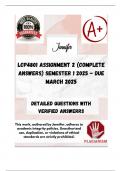,LCP4801 Assignment 2 (COMPLETE ANSWERS) Semester
1 2025 - DUE March 2025; 100% TRUSTED Complete,
trusted solutions and explanations.
Question 1 Name the theory/principle/doctrine/concept that is
being referred to in each of the statements below: 1) One of the
most time-honoured principles of international law is that which
enjoins States to implement their international obligations in
good faith. (1) 2) This is the vehicle through which customary
rules become part of the municipal legal system. (1) 3) In many
countries, and without more, treaties enjoy equal status with
municipal law. (1) 4) This doctrine does not apply in
international law, irrespective of the similarity between the
issues and dispute. (1) 5) “A collectivity of States established by
treaty, with a constitution and common organs, having a
personality distinct from that of its member-States, and being a
subject of international law with treaty-making capacity”. (1) [5]
1. Pacta sunt servanda – This principle requires states to
perform their international obligations in good faith.
2. Incorporation (or Transformation) – The process
through which customary international law is made part of
domestic law.
3. Monism – In monist systems, international treaties are
automatically part of the domestic legal system and have
equal status with national laws.
4. Doctrine of Sovereign Immunity – This doctrine holds
that a sovereign state is immune from the jurisdiction of
foreign courts, even in cases involving similar issues.
, 5. International Organization – This refers to an entity
established by treaty, with its own legal personality and the
capacity to enter into treaties, distinct from its member
states.
Question 2 ‘There is no hierarchy among the sources of
customary international law listed in Article 38(1) of the ICJ
Statute. It is, in fact, nothing but an exercise in futility to attempt
to justify a ranking of some sort among these sources.’ To what
extent does this statement represent the true nature of the
provisions contained in Article 38(1) of the ICJ Statute? [10]
The statement suggests that there is no hierarchy among the
sources of customary international law listed in Article 38(1) of
the Statute of the International Court of Justice (ICJ). To assess
the extent to which this statement represents the true nature of
Article 38(1), we need to analyze both the text of the Article and
how it has been interpreted in practice.
Text of Article 38(1) of the ICJ Statute
Article 38(1) of the ICJ Statute provides a list of sources of
international law that the Court is to apply in resolving disputes.
It states:
"The Court, whose function is to decide in accordance with
international law such disputes as are submitted to it, shall
apply:




